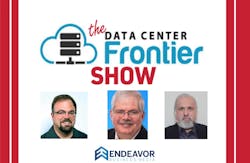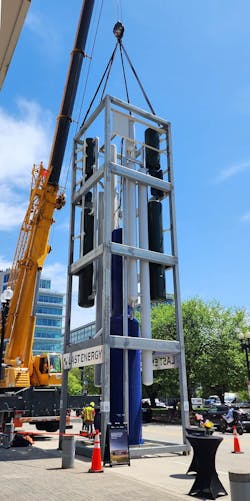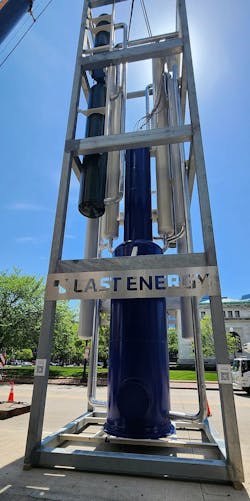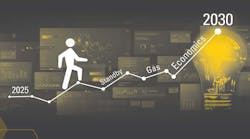Podcast: Data Center Frontier's Rich Miller Talks Gigawatt MegaCampus Predictions
The latest episode of the Data Center Frontier Show Podcast presents an Editors' Summit of sorts, as DCF's founder and Editor at Large Rich Miller drops by to join in the discussion with Editor in Chief Matt Vincent and Senior Editor David Chernicoff.
The editors discuss the challenges of power availability in leading data center markets and the concept of Gigawatt data center campuses as a solution focusing on renewable energy and innovative designs, as reflected by the heavy traction Rich's recent article on the topic received.
Microsoft's lately announced commitment to ten gigawatts of renewable energy, as well as the Infrastructure Masons' recommendation of clean energy parks amounting to about the same, are mentioned, along with the challenges posed by climate change and the need for innovation in renewable energy.
The anecdotal "pricing out" of small data centers due to demand from hyperscalers is also discussed, as were the present, burgeoning prospects for nuclear energy to power the data center industry, including the absolutely accelerating nuclear small modular reactor (SMR) frontier, of which an eyeful was received on the curb in front of the Walter E. Washington Convention Center at last month's Data Center World expo (see below).
Here's a timeline of the podcast's key moments:
1:40 - The DCF editors' mini-summit begins, to discuss recent data center events and travels and deliver kudos on Rich Miller's latest heavily-trafficked article about the expected rise of the Gigawatt data center megacampus. Rich elaborates on the challenges of power availability in leading data center markets and the concept of Gigawatt data center campuses as a solution, focusing on renewable energy and innovative designs.
Trend insights as received from Data Center World are discussed: bigger buildings, larger campuses, and more AI demand is all in the offing. The talk turns to power availability issues in data center markets, and the major challenges in fixing them. The Quantum Loophole "data center city" with sustainability and flexible models is examined.
4:31 - Rich mentions how data center developer Lancium's President Ali Fenn's keynote at Data Center World highlighted prospects for large data center campuses and energy storage in the age of AI, and using them as grid assets to support renewable energy, particularly for AI/ML workloads. This new generation of data centers will use energy storage to support the grid and renewables.
We hear how David attended events of Eaton and JLL and noticed similarities in power discussions. Conversation moves to how data center campuses need to reorient their address toward backup power and generation. The editors peel back the layers on particular reasons for the recent controversy over deploying diesel generators in Maryland.
8:49 - Rich explains how the scale of data center projects like the one in Maryland prompted regulatory concerns, leading to legislative measures and increased awareness for future data center operators entering new markets such as Indiana. Scale is a challenge for environmentally friendly backup generation in data centers. The industry needs to prepare for regulatory challenges as it scales and expands. Talk turns to ways the surge in industry power demand, after ten years of holding steady in the cloud era, then suddenly rocketing to today's generative AI-inspired heights, surprised both data centers and utilities.
15:11 - Rich discusses the disparity in pace between the data center and utility industries, highlighting the challenges in forecasting power demand and the necessity for collaboration to address the growing need for exponential compute capacity scaling along with maximum renewable energy integration.
New Nuclear Has Arrived
The editors then turn to nuclear microreactors and and small SMR prototypes, as actually seen at Data Center World.
Rich says:
"The sign of the times is that Matt and I walk out the front door of the convention center in Washington and Last Energy is there with its prototype nuclear power module -- with no uranium -- but they've got it on a crane in front of the convention center. Because they understand that the data center industry is really interested in nuclear as the long term solution."
Nuclear energy certainly was a hot topic at last month's Data Center World conference, featuring in two keynotes and multiple sessions. Last Energy's SMR prototype came to the conference site in Washington, D.C. with the 22-ton, 48-foot-high assembly suspended from a crane. The prototype, which contained no uranium, is the cornerstone of Last Energy's 20-megawatt power station design.
"DCW 2024 is giving special attention to the data center industry’s energy needs and nuclear power’s unique position to address those needs,” said Michael Crabb, SVP of Commercial at Last Energy, who discussed nuclear strategies in a session at the conference.
During the podcast, Rich said:
"The timelines are what everybody is fixated on and frustrated with at the same time. But I've been going to these conferences for a lot of years, and a year or maybe two years ago...people were afraid to throw up their hands and go, oh yeah, nuclear. But not anymore. Because all of the other solutions suddenly make nuclear look very different, particularly with the SMR kind of design."
The editors then talk about how Microsoft's blockbuster 10 GW renewable energy goal equates with the Infrastructure Masons mandate for clean energy parks. In a huge move to make AI development more sustainable, Microsoft will work with Brookfield to add 10.5 Gigawatts of renewable power to the grids where it is building new data centers. The 10.5 GW of solar and wind power is to be deployed in the US and Europe from 2026-30.
All that's fresh off reports that Microsoft has added 500 MW of capacity since July, and hopes to add another 1 GW of power over the next 6 months. Rich says it's not surprising, and notes that they are not the only hyperscaler in mega-expansion mode to meet AI demand.
The discussion turns to how large investors in data centers will continue to focus on energy and digital infrastructure. David points out that clean energy is important, but the environmental cost of generation needs consideration. Rich reflects on the challenges posed by climate change, the need for innovation in renewable energy, and the role of AI in driving change in the data center industry. Businesses use imaginary future solutions to address climate change challenges all the time, points out Rich.
27:34 - David talks about word received on the road that small data centers are being priced out of the market due to demand from hyperscalers, leading to challenges for enterprise-class businesses needing smaller capacity. That single tenant data centers are easier to finance than multi-tenant ones is noted.
30:10 - Matt brings up the topic of carbon-free energy (CFE) per a talk received at Data Center World, and the challenges around accounting for green energy purchases in data centers. Gridmatic presented at Data Center World as an expert company in the field, along with EdgeConnex Chief Power Officer Raj Chudgar in joint presentation investigating the CFE reckoning concept, to help data centers understand its potential for mitigating energy challenges.
Recent DCF Show Podcast Episodes
- DCF Show: Data Center PR Practice Fosters Coalitions, Community Outreach to Reduce Development Backlash
- DCF Show: Data Center Construction and Dallas Market Talk with Burns & McDonnell
- DCF Show: The Top 5 Data Center Industry Stories of Q4
- DCF Show: Steve Madden, Equinix VP of Digital Transformation and Segmentation Marketing
- DCF Show: 8 Key Data Center Industry Themes for 2024, Part 3
Did you like this episode? Be sure to subscribe to the Data Center Frontier show at Podbean to receive future episodes on your app.
Keep pace with the fast-moving world of data centers and cloud computing by connecting with Data Center Frontier on LinkedIn, following us on X/Twitter and Facebook, and signing up for our weekly newsletters using the form below.
About the Author
Matt Vincent
A B2B technology journalist and editor with more than two decades of experience, Matt Vincent is Editor in Chief of Data Center Frontier.




